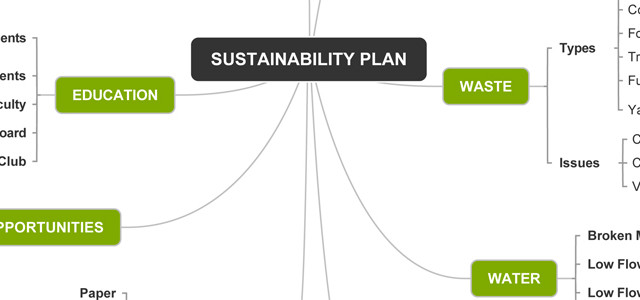It’s Not As Easy As Just Turning Off The Lights
Carolyn Anthon, a student graduate of JHU’s Environmental Sciences and Policy Program, has learned just how challenging it is to implement a sustainability program. As a part of Will O’Brien’s sustainability class, Carolyn’s (and her partner’s) task was to create a sustainability plan specific to a current business which met their specific needs. Taking the assignment further than the class, she chose to create a plan for her current place of employment, a small private school in Maryland and put it into action. After the semester was completed, she became the point person for implementing the plan she created.
Now, a year into her continuing sustainability role, Carolyn can share some hard learned lessons about culture change, applicability, and going green. As her collaborator on the original sustainability plan, I wanted to ask her a few questions about her adventures in sustainability at the K-12 school level.
Q: What have been your biggest challenges?
I think the most challenging aspect of our sustainability adventure at my school is changing behavior. Status quo is easy to maintain, and overcoming that – even with folks who are on board with the idea of sustainability – has proven quite difficult. Also, I found it challenging to get students involved. The change has to come from within in order to create buy-in and sense of ownership within the community. I could list more roadblocks and hurdles, but these are the two biggest things that come to mind.
Q: What were your easy wins?
The easiest win was creating a sustainability committee almost immediately after delivery of the sustainability plan. Following that, we’ve started a GOOS (good on one side) paper collection in several areas of the building to capture and reuse paper one more time before it hits the recycling bin. A group of students is currently campaigning to have a meatless lunch day once per week all year long in support of climate change and sustainability. Plus the school had already reached some of the low-hanging fruit, so much of what lies ahead is more challenging.
Q: How did staff, teachers, and students respond to “sustainability”?
This question makes me chuckle. In my naiveté, I didn’t realize that there would be so many different responses! Based on the survey we conducted before the sustainability plan, most folks really saw sustainability the same as recycling. Others saw it as being “green” or conserving resources. Once we began talking about it some more in the community, others began to see it as a long-term, never-ending effort to manage our resources in an efficient, financially responsible, and environmentally friendly way. The general response has been very positive – verbally – but the actions have yet to catch up with that spoken support. I’ve found that unless it’s easy or convenient to be sustainable, many just do whatever comes naturally to them. I fear I’ll always be pulling out compostables from the trash or telling people to be careful that they only have one plate for their lunch.
Q: Composting is a big action item for schools these days, what did your composting program look like?
Our composting program began spring 2012 with five pick-ups a week from Envirelation. I think we are very fortunate to be working with a company that takes ALL food scraps so no sorting or scraping is necessary. Envirelation also accepts waxy paper, such as dixie cups, paper napkins, and our compostable dinnerware and utensils. Waste stations adorn each lunch room with additional compost scrap pails in faculty lounges and the on-site kitchen. Our staff has been mindful of purchasing compostable-only materials for serving, so this year we’ve also replaced all fancy plastic cups used for campus events with a compostable option. Thus far we’ve decreased our regular trash pick-ups from five times to twice per week. I hope to see continued decrease as waste sorting improves.
Q: Hindsight is 20/20 they say. What do you wish you knew a year ago that could have helped you?
I wish I had a better idea of the structure for decision-making within my school. I also wish that I was more assertive and confident when delivering information. Without an official title, I’m just a volunteer advocate for a volunteer committee. Getting things done seems to get hampered by that trivial missing epithet. Finally, I really wish I knew how painfully slow the process of change would be. I think I would have been better prepared for the frustrations associated and appreciated the easy-wins much earlier.
Q: Do you have any advice for someone starting a sustainability program in their school?
I think the first thing you need to do after getting permission to start one is to establish buy-in. If you don’t already have a group of folks pumped-up about sustainability who are willing to share in the advocacy with you – and even if you do – go out there and get buy-in from the students, faculty, and staff. Connect their actions to reasoning for change. Show them the powerful photographs of Chris Jordan’s Midway series. Talk about the importance of the compost cycle to our agricultural process. Ask your community to think about one action that they could do to make a difference and have them each make a pledge. And realize that you’re not alone in the good fight, but that you will need a lot of patience and fortitude to persevere.
Carolyn Anthon, graduated from the MS in Environmental Science and Policy Program in 2012.
Jessica Riehl, will graduate in 2013 with an MS in Environmental Science and Policy.


